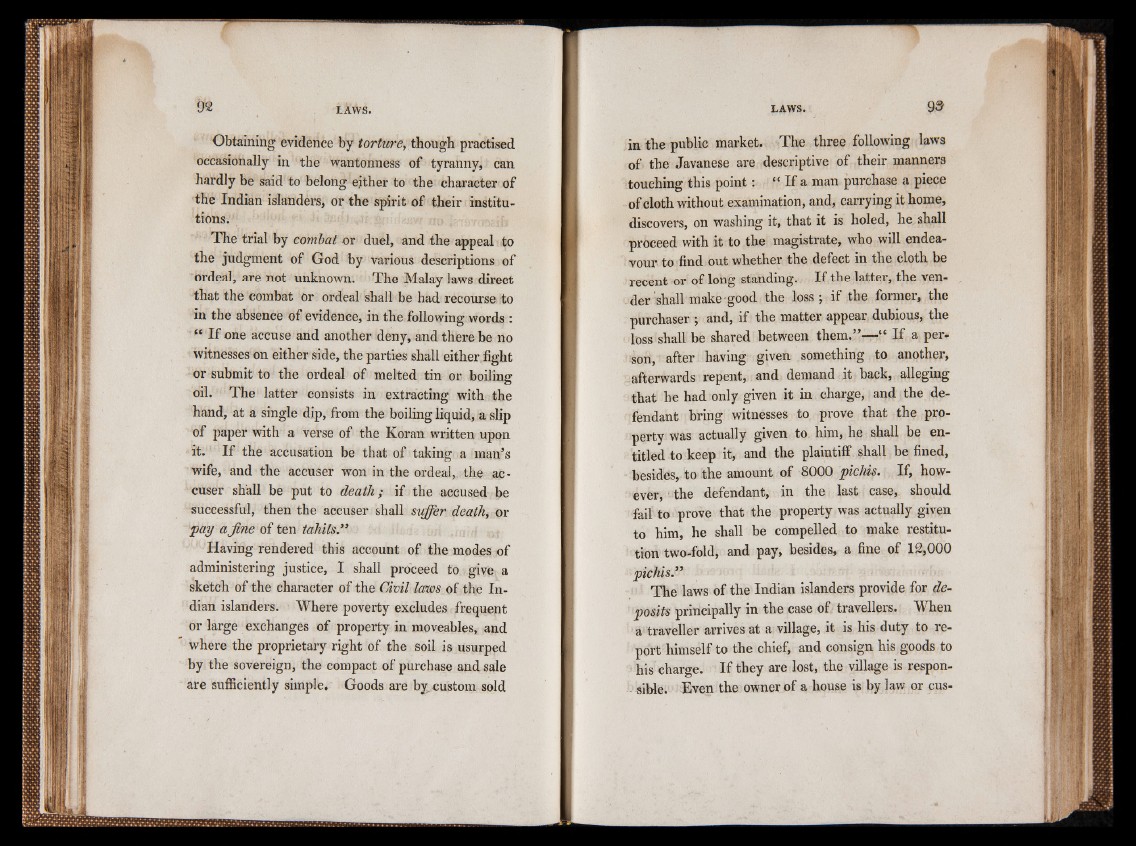
Obtaining evidence by torture, though, practised
occasionally in the wantonness of tyranny, can
hardly be said to belong either to the character of
the Indian islanders, or the spirit of their institutions.
The trial by combat or duel, and the appeal to
the judgment of God by various descriptions of
ordeal, are not unknown. The Malay laws direct
that the combat or ordeal shall be had recourse to
in the absence of evidence, in the following words :
“ If one accuse and another deny, and there be no
witnesses on either side, the parties shall either fight
or submit to the ordeal of melted tin or boiling
oil. The latter consists in extracting with the
hand, at a single dip, from the boiling liquid, a slip
of paper with a verse of the Koran written upon
it. ' If the accusation be that of taking a man’s
wife, and the accuser won in the ordeal, the accuser
shall be put to death; if the accused be
successful, then the accuser shall suffer death, or
pay a fine of ten tahils.,>
Having rendered this account of the modes of
administering justice, I shall proceed to give a
sketch of the character of the Civil laws of the Indian
islanders. Where poverty excludes frequent
or large exchanges of property in moveables, and
where the proprietary right of the soil is usurped
by the sovereign, the compact of purchase and sale
are sufficiently simple. Goods are by custom sold
in the public market. The three following laws
of the Javanese are descriptive of their manners
touching this point: “ If a man purchase a piece
of cloth without examination, and, carrying it home,
discovers, on washing it, that it is holed, he shall
proceed with it to the magistrate, who will endeavour
to find out whether the defect in the cloth be
recent or of long standing. If the latter, the vender
shall make-good the loss y if the former, the
purchaser ; and, if the matter appear dubious, the
loss shall be shared between them.”—“ If a person,
after having given something to another,
afterwards repent, and demand it back, alleging
that he had only given it in charge, and the defendant
bring witnesses to prove that the property
was actually given to him, he shall be entitled
to keep it, and the plaintiff shall be fined,
besides, to the amount of 8000 pichis. If, however,
’ the defendant, m the last case, should
fail to prove that the property was actually given
to him, he shall be compelled to make restitution
two-fold, and pay, besides, a fine of 12,000
pichis.”
The laws of the Indian islanders provide for deposits
principally in the case of travellers. When
a traveller arrives at a village, it is his duty to report
himself to the chief, and consign his goods to
his charge. If they are lost, the village is responsible.
Even the owner of a house is by law or cus